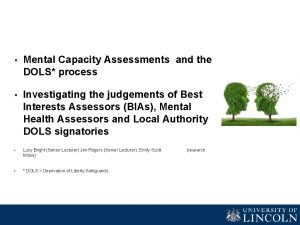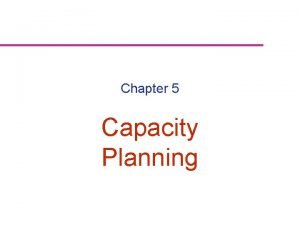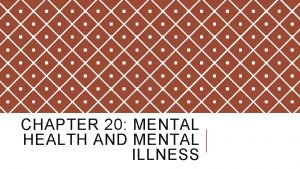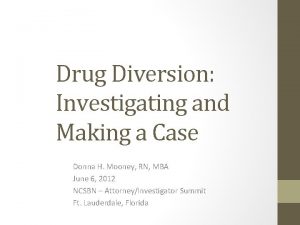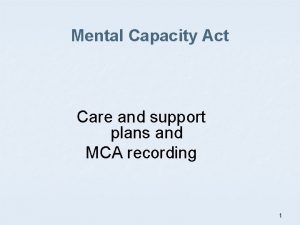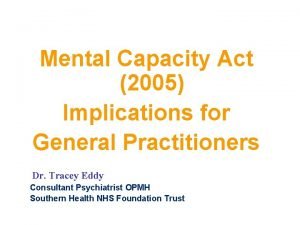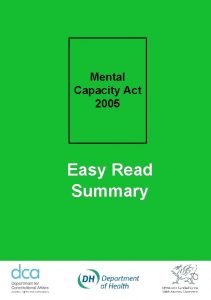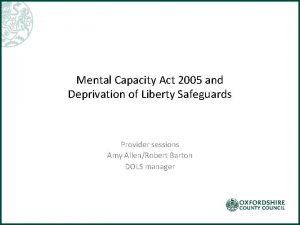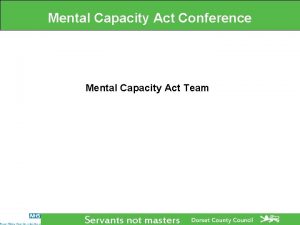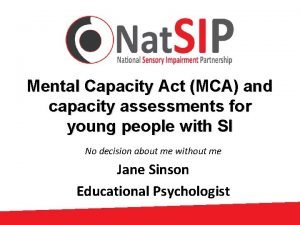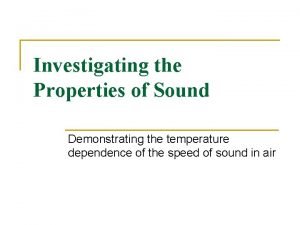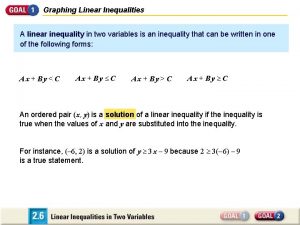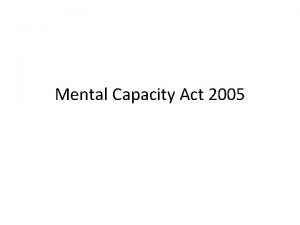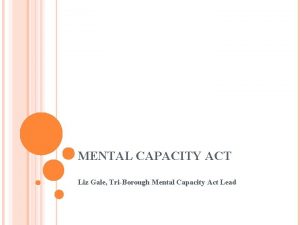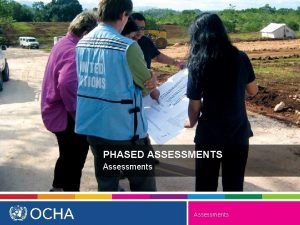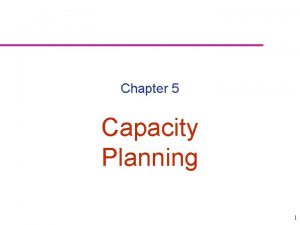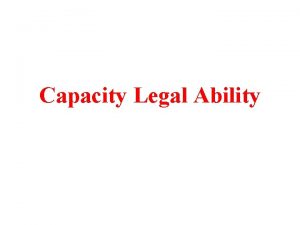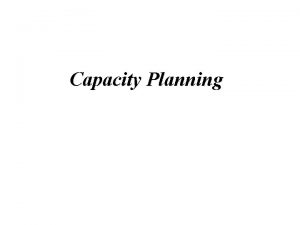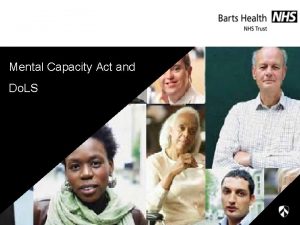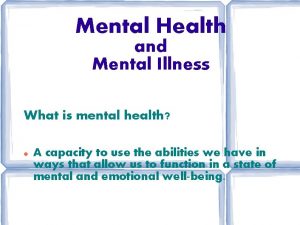Mental Capacity Assessments and the DOLS process Investigating




























- Slides: 28

• Mental Capacity Assessments and the DOLS* process • Investigating the judgements of Best Interests Assessors (BIAs), Mental Health Assessors and Local Authority DOLS signatories • Lucy Bright (Senior Lecturer) Jim Rogers (Senior Lecturer), Emily Scott (research fellow) • * DOLS = Deprivation of Liberty Safeguards

Rationale for the study 1. Conducting the necessary assessments which are required by the DOLS regulations, including mental capacity assessments, has become a very important and burdensome task for the health and social care system, currently costing an estimated £ 1 billion per year (Law Commission Impact Assessment 2015) • 152, 000 DOLS assessments were completed in 2016/17 ( NHS digital 2017) 2. Capacity assessments are pivotal in the DOLS process as in wider considerations about the right to autonomy and the extent of decision making ability in relation to care and treatment 3. Designing and delivering BIA training since the outset in 2009

Changes proposed in the new Liberty Protection safeguards 1. New wording in relation to capacity assessments ‘We therefore consider it more accurate, and more closely aligned to Article 5, to provide that the person must lack capacity to consent to the care or treatment arrangements which would give rise to a deprivation of that person’s liberty. ’ (Law Commission 2017) currently ‘that the person must lack capacity in relation to whether they should be accommodated in the relevant hospital or care home for the purpose of being given the relevant care or treatment’ 2. A change in how capacity assessments are conducted. Unless there are objections no proposal for a specialist assessor to conduct the capacity assessment. ‘In most cases, the “responsible body” would conduct – making use of existing assessments where possible – a capacity assessment…. ’ Note: A mental capacity amendment bill was debated in the House of Lords, July 2018. In a potentially significant reversal govt propose that care homes should be the responsible body tasked with collating assessments. See later slides. Capacity assessments remain central to the existing and to any replacement regulations

Context • Systematic academic reviews, and comprehensive national reports have repeatedly pointed to inconsistencies in the application of the Mental Capacity Act (MCA) with particular reference to the decision making of those tasked with implementing it (House of Lords, 2014; Hinsliff-Smith et al 2015) • Guidance has been produced to assist, including useful audit tools (see SCIE* and specific guidance from ADASS** which assists those completing DOLS assessments) • However, there have been few published studies of actual practice in relation to the implementation of the MCA and fewer which specifically look at how people make judgements about mental capacity, or look specifically at judgements in relation to DOLS • Tensions between the existing MCA approach and the aims and requirements of the UNCRPD • • • * SCIE Social Care Institute for Excellence ** ADASS Association of Directors of Adult Social Services *** UNCRPD United Nation Convention on the Rights of Persons with Disabilities

Importance to Social Work 1. The majority of Best Interests Assessors are experienced social workers 2. Knowledge and Skills Statement for Social Workers in Adult Services ‘Social workers should understand how to make a capacity assessment, the decision and time specific nature of capacity and hence the need to reassess capacity appropriately. They should know when and how to refer to a Best Interest Assessor’.

Mental Capacity Assessments. More complex than the MCA 2005 suggests? Chariand (2001) - Two aspects of capacity - ‘descriptive’ and ‘normative’ Banner (2012) - The functional test of capacity in the MCA, as in other jurisdictions, turns on the quality of understanding that a patient demonstrates. A ‘cognitive’ approach to assessing capacity dominates with assumptions that the constituent elements of capacity can be clearly described and operationalised, and that capacity is objectively measurable.

This ignores ‘normative’ elements. ‘Specifically, assessing the criterion of using, weighing or balancing information involves the clinician making a judgement that hinges upon whether the patient is appropriating and using the information given in the way that he… ought to. Importantly, this sense of how the patient ‘ought to’ use information is open to interpretation by clinicians, and it is my contention that this is what gives rise to disagreement in difficult cases’ (Banner 2012) ‘there is a space between an unwise decision and one which an individual does not have the mental capacity to take and. . . it is important to respect that space, and to ensure that it is preserved, for it is within that space that an individual’s autonomy operates’ (PC and NC v City of York Council).

Bingham (2011) illustrates how ‘normative ethics’ influence legal and clinical judgements. Principles of respect for autonomy may conflict with the principles of beneficence or non-maleficence Two illustrative cases 1. Re MB. : Principle of beneficence dominant 2. Emma Gough : Principle of autonomy dominant Where decision making not clear cut, ethical frameworks may assist in interpreting issues relating to capacity and autonomy

Guidance from professional codes of conduct 'Normative', values based guidance? Social work - claims to particular focus on complexity of interactions between human beings and their environment and in international statements, TWO key core values: 1. human rights and human dignity 2. social justice. but Hugman (2005): Formal statements of SW ethics close or identical to those of other helping professions How might professional ethics influence judgements about capacity and the right to autonomy? Will the role be more important here than professional training and codes of ethics?

Hypothesis: that the three different groups would have measurably different views and approaches to the required assessments. Mental Health Assessors = medically trained BIAs = largely Social workers, some nurses and OT’s DOLS signatories = mixed

Existing research on Mental Capacity Assessments 1. Alonzi et al. (2009) Staff unclear about assessing capacity and patient decision making. 2. Hinsliff Smith et al (2015) Systematic review Inconsistencies in the application of the Act are apparent across a variety of care settings. 3. Brown et al (2015) Capacity assessments in psychiatric settings. Capacity assessments were documented in 1, 732/17, 744 admissions (9. 8%) with a small increase across the study period (2006 -10). In only 14. 7% of capacity assessments were the MCA criteria for assessing capacity explicitly used.

4. Jayes, et al (2017) Acute hospital and intermediate care settings in England. Most staff reported finding capacity assessment challenging, due to time pressures, a perceived lack of knowledge or skills and encountering practice that is not consistent with legal requirements 5. Ratcliff and Chapman (2016) Health and social care practitioners’ experiences of assessing mental capacity in a community learning disability team (eight interviews) Recognition of challenges and complexities. Generally positive about impact of MCA in comparison to prior practice 6. Samsi K. , Manthorpe J. , Nagendran T. & Heath H. (2012) An interview based study of community-based specialist nurses working in dementia care. Lack of confidence in understanding of MCA 7. Willner et al (2010, 2013). Impact of MCA training for NHS Staff. Complexities and difficulties for practitioners, particularly with the weighing up element of the capacity assessment

What did we do? 1. Develop four case vignettes ‘ as hybrid of traditional experimental and survey methods, vignette studies can offer aspects of both the high internal validity of experiments and high external validity of survey research in order to disentangle multiple predictors of clinician behaviour’ (Evans et al 2015). 2. Obtain permissions - see later slide 3. Recruit individuals from three groups involved in the DOLS assessment process 1. Best Interests Assessors (BIAs), 2. Mental Health Assessors, and 3. DOLS signatories. 4. Conduct telephone interviews 5. Analyse the transcripts using thematic analysis.

The research process Permissions 1. 2. NHS Local Authorities ( individual authorities and ADASS - Association of Directors of Adult Social Services)

The interviews We asked each person the following questions in relation to the vignettes. 1 What ‘practicable steps’ would you take or expect to have seen taken in order to support the person make their own decision? 2 What questions would you ask or expect to see asked in order to assess capacity? 3 What information would you give to the person (or expect to have been given to the person) in order to assess the person’s ability to understand, retain and weigh the information? To try to get a clear sense of the decision process we then asked: 4 While we appreciate that you would need to do a full capacity assessment with the person, from the information provided in the vignette, would you say the person is likely to have capacity to consent to their care and treatment arrangements? (Yes/No)

The interviews • We then asked about a range of factors that might influence judgements about mental capacity • These included • (a) Case law (b) Risk of harm to person if not in 24 hour care (c) Current presentation of person (d) Information from others about person’s impairments and how they impact on them (e) Previous capacity assessments (f) The person’s ability to communicate with you (g) Professional values and codes of conduct (h) Fear of litigation

Initial findings - (fifteen BIAs, three Mental Health Assessors and three DOLS signatories) 1. No mention by BIAs of two stage MCA test for capacity, in particular the ‘diagnostic’ test and how this would be identified. MHAs did refer to this. 2. No mention of ‘causative nexus’ (Legal guidance suggests that the link between the two stages of the capacity test should be made explicit i. e. that it is the identified impairment that is leading to and causing the inability to make a particular decision)

3. The 'normative' dimension of capacity assessments is acknowledged by some assessors particularly the sort of contentious ones that end up in the court of protection, the area often most difficult is using a 'weigh': so the assessor is being asked to make a judgement about whether the subject's ability to use a weigh is sufficient to meet the task in the MCA. That is a bit of a subjective judgement. . what is a standard for a reasonable person in those circumstances? . . . . a problem that runs through all of this is that in the MCA decision making is seen as a rather cognitive process. . some decisions are made that way. . . but. . . . many disorders have the result that the person just decides something on an emotional basis not on a cognitive basis at all. ‘There is pseudo ' objectivity about the way we are expected to assess capacity. …’weighing’ has many meanings, to different assessors’.

Importance of professional values and codes of conduct in considerations of capacity 1. Best Interests Assessors - BIA 2. Mental Health Assessors - MHA 3. DOLs Signatories (Local Authorities)

Initial findings 4. Complexity. Most participants refer to the need to assess a person’s capacity to consent to alternative arrangements as well as the current ones (despite this not being the specific legal wording) 5. Street Level Bureaucracy. Many general comments about volume of work for DOLS authorisations and lack of time/resources to carry out capacity assessments thoroughly. 6. No mention of UNCRPD (matches our experience of teaching BIA programmes)

Who should conduct the necessary capacity assessment? A DOLS signatory - ‘my view has always been that the assessment around whether they have capacity to consent to wherever they are being accommodated for treatment should be done by the people who are arranging the admission. . . all the weight around capacity assessment and looking at initial placement should be done before placement'.

A number of assessors commented on the quality of care home capacity assessments, and noted that care homes may have a vested interest in finding a ‘lack of capacity’. This may be important given the government proposals to rely on care homes to collate assessments and be responsible for many aspects of the process in the scheme Also noted were the risk of social workers undertaking the main capacity assessment when they are organising crisis admissions to care homes and the disincentive to take people back out of 24 hour placements in relation to work load pressures.

Conclusions If capacity assessments are purely based on objective, measurable cognitive factors, who conducts them will not matter so long as they follow guidance correctly If capacity assessments are much more 'normatively' driven then outcomes will vary according to who conducts them, based on personal and professional values, and role demands A need for more explicit recognition that values and norms will influence capacity assessment judgements? Views remain diverse as to who should conduct capacity assessments and why

Conclusions There needs to be more emphasis on the elements of the MCA which refer to supported decision making and methods of maximising autonomy, rather than a simply procedural approach or the paternalistic approach which has continued in much practice according to national reports (e. g. House of Lords 2014). In relation to one of the ‘grand challenges’ identified in themes for this conference, such an approach may allow individuals to age with more dignity and autonomy.

Potential benefits • Findings may help all involved with implementing the Deprivation of Liberty Safeguards (DOLS) • They may also assist more broadly with all who are tasked with conducting mental capacity assessments as required by the MCA (2005). There may be impact and value for many of the 1. 6 million staff who work in social care and the 1. 4 million who work in the NHS

Next steps • Writing a report summarising the findings for dissemination to all participants and to relevant NHS and local authority bodies • Writing a paper for submission to a Social Work Journal • Developing a bid to the Nuffield Foundation, under their ‘Law in Society’ funding stream • Broadening the research to look at capacity assessments more generally

References Alonzi, A. et al (2009) Assessing staff needs for guidance on the Mental Capacity Act 2005. Nursing Times; 105: 3, 24 -27. Banner , N. (2012) Unreasonable reasons: normative judgements in the assessment of mental capacity. Journal of Evaluation in Clinical Practice, 18, 1038 -1044. Bingham, S ( 2012) Refusal of treatment and decision-making capacity. Nursing Ethics. 2012 Jan, 19(1): 167 -72. Brown, Penelope F. ; Tulloch, Alex D. ; Mackenzie, Charlotte; Owen, Gareth S. ; Szmukler, George; Hotopf, Matthew (2013) BMC Psychiatry, Vol 13, Apr 15, 2013 Chariand, L. ( 2001) Mental competence and value: The problem of normativity in the assessment of decision‐making capacity. Psychiatry, Psychology and Law. 8, 2, 135 -145 Evans, S. et al. (2015). Vignette methodologies for studying clinicians’ decision-making: Validity, utility, and application in ICD-11 field studies. International Journal of Clinical and Health Psychology, 15, 160 -170 Hinsliff –Smith et al (2017) What do we know about the application of the Mental Capacity Act (2005) in healthcare practice regarding decision-making for frail and older people? A systematic literature review. Health and Social Care in the Community, 25(2), 295– 308 House of Lords (2014) Report of Session 2013 -14. Mental Capacity Act 2005: post-legislative scrutiny. London: TSO Hugman, R ( 2011) An ethical perspective on Social Work in Cree, V ( ed) Social Work A Reader. London, Routledge Jayes et al (2017) An exploration of mental capacity assessment within acute hospital and intermediate care settings in England: A focus group study. Disability and Rehabilitation, 39(21), pp. 2148 -2157. Law Commission (2015). Mental Capacity and Detention. Impact Assessment. London: The Law Commission

NHS Digital (2017) Mental Capacity Act (2005) Deprivation of Liberty Safeguards, (England) 2016/17, Official Statistics. NHS Digital. Available at : https: //digital. nhs. uk/data-and-information/publications/statistical/mental-capacity-act-2005 -deprivation-of-liberty-safeguardsassessments/mental-capacity-act-2005 -deprivation-of-liberty-safeguards-england-2016 -17 -official-statistics Ratcliff , R. , and Chapman, M. Health and social care practitioners’ experiences of assessing mental capacity in a community learning disability team. British Journal of Learning Disabilities, 44, 4, 329 -336 Samsi K. , Manthorpe J. , Nagendran T. & Heath H. (2012) Challenges and expectations of the Mental Capacity Act 2005: an interview based study of community-based specialist nurses working in dementia care. Journal of Clinical Nursing, 21 (11– 12): 1697– 705. Willner P. , Bailey R. , Parry R. & Dymond S. (2010) Evaluation of the ability of people with intellectual disabilities to ‘weigh up’ information in two tests of financial reasoning. Journal of Intellectual Disability Research, 54 (4): 380– 91. Willner P. , Jenkins R. , Rees P. , Griffiths V. & John E. (2011) Knowledge of mental capacity issues in community teams for adults with learning disabilities. Journal of Applied Research in Intellectual Disabilities, 24 (2): 159– 71. Willner P. , Bridle J. , Price V. , Dymond S. & Lewis G. (2013) What do NHS staff learn from training on the Mental Capacity Act (2005)? Legal and Criminological Psychology, 18 (1): 83– 101.
 Six dols assessments
Six dols assessments Mca and dols
Mca and dols Specific heat capacity question
Specific heat capacity question Worcestershire dols
Worcestershire dols Channel capacity planning
Channel capacity planning Mental health and mental illness chapter 20
Mental health and mental illness chapter 20 Investigating and making a case for drug diversion
Investigating and making a case for drug diversion Cpalms investigating plant and animal cells
Cpalms investigating plant and animal cells 5 mca principles
5 mca principles Care planning cycle
Care planning cycle Mental capacity assessment example
Mental capacity assessment example Mental capacity act 2005 easy read
Mental capacity act 2005 easy read Mental capacity act 2005 summary
Mental capacity act 2005 summary 5 principles of mental capacity
5 principles of mental capacity 5 principles of the mental capacity act
5 principles of the mental capacity act 5 principles of the mental capacity act
5 principles of the mental capacity act Mental capacity act assessment
Mental capacity act assessment Mental health jeopardy questions and answers
Mental health jeopardy questions and answers Investigating the properties of sound
Investigating the properties of sound Investigating science hsc
Investigating science hsc Investigating graphs of functions for their properties
Investigating graphs of functions for their properties Investigating graphs of polynomial functions
Investigating graphs of polynomial functions Investigating customer service
Investigating customer service Investigating the world of work. lesson 1
Investigating the world of work. lesson 1 Investigating graphs of polynomial functions
Investigating graphs of polynomial functions Unit 14 investigating customer service assignment 1
Unit 14 investigating customer service assignment 1 Investigating the graph of an inequality
Investigating the graph of an inequality Investigating digital graphics
Investigating digital graphics Investigating polynomials
Investigating polynomials
